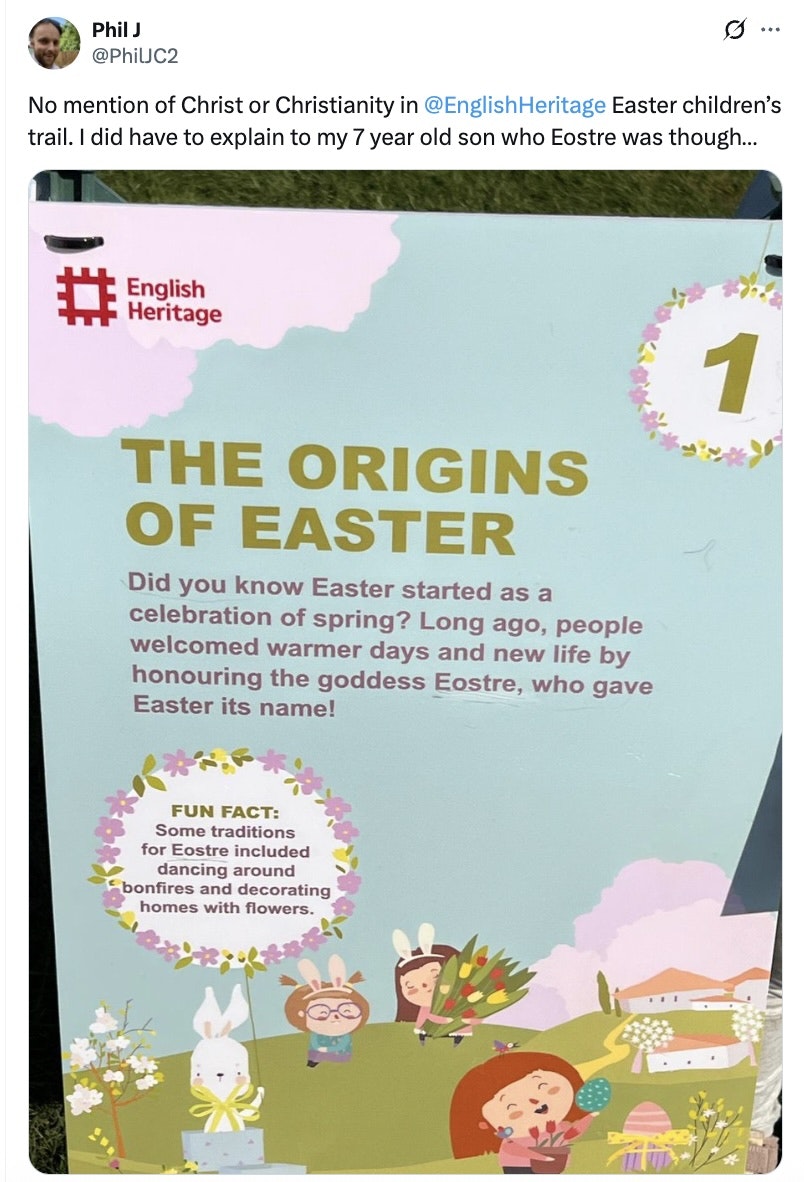A noble institution should not compromise its mission for the sake of modish inclusivity
Just whose feet walked England’s mountains green in ancient time? And just who was in England’s pleasant pastures seen? It’s a hot button issue, because according to English Heritage, it was the dainty feet of the Anglo-Saxon goddess Eostere. Well we presume her feet were dainty, but they might have been great yomping spades trampling the Saxon’s crops every April for all we know. Our one piece of evidence for her existence is a brief description in Bede of a goddess that gave her name to a month that coincided with the celebration of passover. Indeed, historians have speculated that Eostore may have been invented entirely.
Whilst an interesting historical curiosity for scholars to argue over, it has little bearing on Easter as the English have celebrated it over the centuries. The familiar customs, from egg-rolling to hot cross buns to lamb on Easter Sunday, are all entirely derived from the traditional marking of Christ’s passion, death and resurrection, tied to the Jewish festival of Passover. Its origins are nearly 2000 years old, long pre-dating the existence of the English as a people and a nation.
So it was baffling to learn that English Heritage, an organisation committed to preserving and communicating English history and culture, designed an “Easter Adventure Quest” for children that lectured them on the dubious Germanic deity Eostore, but made no mention of Jesus, Christianity or Passover. A concerned father on Twitter shared this fact on social media:
English Heritage responded online, claiming “this is one point on our Children’s Easter Adventure Quest which features a variety of fun facts about seasonal traditions, relating to different cultures and religions which includes Christianity.” But Phil has confirmed to me that the other material had no mention of Christianity, later sharing further images on Twitter supporting his claim.
I reached out to English Heritage, who have yet to present me with any documents or images showing that the “Easter Adventure Quest” mentions Christianity alongside its (highly misleading) claim that Easter’s origins are pagan. It’s more than the merely staid secular Easter story of bunny rabbits and chocolate — the materials offer an alternative religious narrative about Easter, whilst excluding Christianity entirely.
We can only speculate about the motives for choosing to present Easter in this way. But it reflects an alarming trend. Whilst non-Christian religions can be safely “celebrated”, Christianity as the formerly hegemonic faith of this country is seen as threatening, covertly evangelising and inappropriate. In many parts of the cultural establishment, celebrating our history is seen as disgraceful and dangerous — questioning and subverting it honourable and fair-minded.
The power of this agenda is that it works with the grain of cultural amnesia. Traditional songs and games are forgotten, classic texts go untaught in schools and civic rituals fall into abeyance. A social and technological fluidity, in which labour and capital flow ever faster, erodes and disrupts slower-paced oral and literary cultures. It’s entirely possible that the individuals responsible for the misleading posters and booklet were simply ignorant of what they were doing. But the result is just the same as if they were motivated by ideology.
Thousands of impressionable children, it seems, have been given a false impression about their heritage by the very organisation dedicated to defending it. It’s uniquely disappointing, because unlike the National Trust, which has swerved far from its core mission in pursuit of political relevance, English Heritage is generally a straightforward and worthy organisation.
Institutions like English Heritage matter … It’s vital that they don’t get turned into political battlefields
If you log onto the English Heritage website, and look at what it says about Easter, you will not find poorly informed screeds about Bablyonian fertility deities. Instead, you’ll be pleasantly surprised to discover a historically robust and accessibly written account of Easter and its customs that correctly centres its Christian nature and origins. There’s also a wonderful section on traditional Easter games, which again makes reference to Christianity.
Institutions like English Heritage matter, because they are bulwarks against the erosive forces of cultural and civilisational amnesia. In an age where traditional communities are increasingly disrupted, it is bodies like these that we count on to be the guardians of our history and culture. It’s vital that they don’t get turned into political battlefields, and that they convey an accurate and positive vision of our heritage to people of every background and walk of life.
We can hope that English Heritage will learn the lesson of this controversy, and get back to doing what it generally does so well — preserving and passing on the rich and beautiful history of England to future generations.








